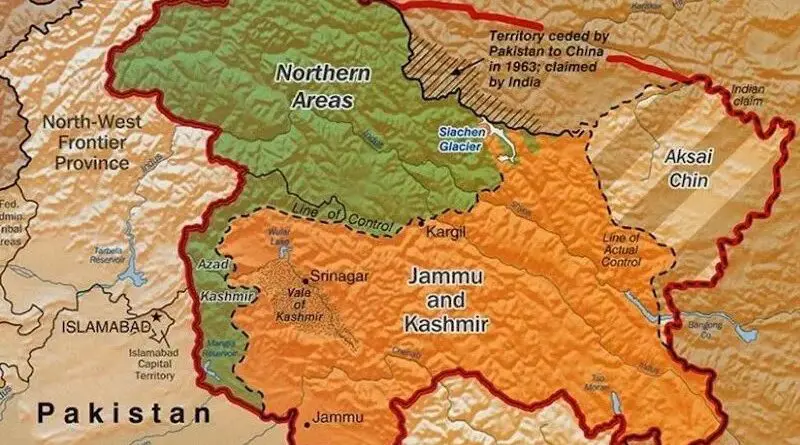India’s Anti-Encroachment Campaign In Kashmir: Serious Breach Of International Law – OpEd
The decision to revoke Jammu and Kashmir’s autonomy after 70 years has been hailed by India’s BJP-led government as the rectification of a “historical folly.” The Indian Hindutva policy is reflected in the persistent violence perpetrated by the Indian occupation forces (IOFs), the anti-encroachment campaign started by the Indian occupation administration since February 4, 2023, in addition to draconian Indian legislation, and efforts to alter the demographic makeup of the Indian-occupied territory of Kashmir (IIOJK).
Initially, Article 370 granted the state the authority to pass laws, a separate flag, and a certain amount of autonomy (which is no longer possible). The central government could handle all matters pertaining to foreign policy, defence, and communications. Jammu and Kashmir was therefore permitted to establish its own laws governing long-term residence, property ownership, and fundamental rights. However, as part of his election strategy, the moodi government repealed Article 370 in August 2019. As a result, Kashmir no longer has a significant degree of autonomy and must now adhere to the Indian Constitution, which may prevent Indians from other states from relocating there or buying property there.
In recent years, following gunfights between security forces and militants in Indian-occupied Kashmir, the government has set fire to civilian properties. With the adoption of this policy, security personnel are choosing to tear down suspected militant hideouts rather than engage in drawn-out gun battles. They contend that destruction of property is more tolerable to the general public than human fatalities. Army troops have occasionally set houses on fire as a kind of collective punishment or in revenge for strikes against their own soldiers in the past, but this has become more common in recent years.
Destruction of property, particularly residences, can lead to a large quantity of loss that is frequently of enormous value and irreversible. Those whose homes were destroyed remembered that Kashmiris had spent more than 50 years sweating blood to construct these mansions. Everything has been gone now, including houses with works of art, documents, historical artefacts, and credentials. The IIOJK received a Genocide Watch report that warned of the potential risk of genocide under the current Indian government, which is governed by the RSS-inspired Bharatiya Janata Party. Not only this, but six other harsh laws, including the Jammu and Kashmir Public Safety Act, the Terrorist and Disruptive Activities (Prevention) Act, the Military Forces (Jammu and Kashmir) Special Powers Act, and the Prevention of Terrorism Act, were also put into effect by the Indian government. Several store proprietors are among the hundreds of families that have been uprooted as invaders and land snatchers and immediately removed from the land by the Evacuee Property Department.
The demarcation of evacuee land at different locations, followed by ongoing demolitions and forcible evictions, is a gross violation of human rights. Amnesty International asked that the Indian government end its anti-encroachment campaign in IIOJK immediately. According to the Amnesty statement, “the ongoing demolitions” “appear to be an extension of the horrendous human rights crimes the region of Jammu and Kashmir, the only region of India with a Muslim majority, has historically experienced,”
According to Article 53 of the Fourth Geneva Convention, these activities violate the rules of war, which contain important measures to preserve property in occupied territory. Armed forces that purposefully destroy civilian property during hostilities are subject to financial culpability under Article 3 of the Hague Convention of 1907. Yet, security forces in Kashmir deliberately set fire to civilian homes as a form of punishment, paying little to no compensation and violating their rights under international humanitarian law while going unpunished. As a result, residents in Kashmir are left to suffer. Similar to this, everyone has the right to sufficient housing, which includes a ban on forcible evictions, under the International Covenant on Economic, Social, and Cultural Rights, to which India is a state party.
To sum up, one can infer that even in the midst of an armed conflict, property rights must be preserved and safeguarded, according to international humanitarian law. Yet, the Indian army has been destroying homes in Kashmir illegally and willfully, rendering residents homeless. There is no military requirement for this punitive strategy of firebombing homes, and families are not given compensation for their loss of home and goods. In a conflict-torn territory that has already suffered greatly during its eight decades of occupation, these encounters violate the laws of war and cause human suffering that is simply preventable. Due to Indian abuses of international law and use of violence against people, the UN should get involved in the IIOJK issue. The UN should make use of provisions that allow for retaliatory action in response to acts of aggression, breaches of the peace, and threats to the peace. Proceedings on the topic of cutting off diplomatic and economic ties with the belligerent nation are included in this. Indian lawlessness offers a suitable and proper setting for the application of international law.

